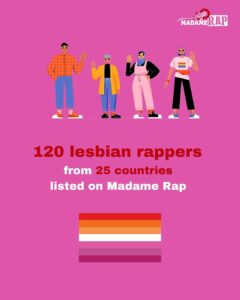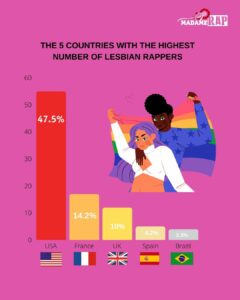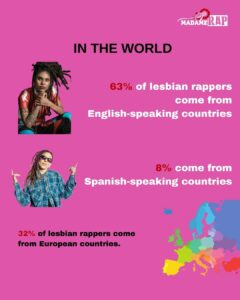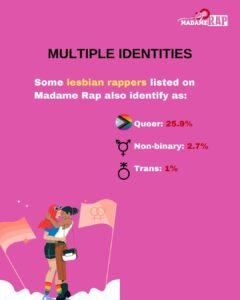NAME: Zitouna
TRACK: Mélodie d’ascenseur
YEAR: 2025
FROM: Lyon, France
NAME: Zitouna
TRACK: Mélodie d’ascenseur
YEAR: 2025
FROM: Lyon, France
Explicit content ahead: These artists pushed boundaries and changed the game.
Today’s raunchiest rap lyrics barely raise an eyebrow. While stars like Ice Spice, Nicki Minaj, Cardi B, or Megan Thee Stallion might still ruffle conservative feathers, sexually explicit content has been woven into rap’s DNA for decades — thanks largely to a generation of fearless female pioneers.
The late 1980s marked a turning point. As gangsta rap exploded across the US, a new breed of “hardcore” female rappers emerged, refusing to let men monopolize discussions of sex and desire. Groups like Salt-N-Pepa broke ground with anthems like “Let’s Talk About Sex,” while TLC‘s “Ain’t 2 Proud 2 Beg”, BWP (Bytches With Problems) and HWA (Hoez With Attitude) carved out space for women to openly celebrate their sexuality on their own terms.
By the mid-’90s, artists like Lil’ Kim and Foxy Brown — whose nickname “Ill Na Na” left little to the imagination — had become hypersexualized icons. They rapped unapologetically about female anatomy and pleasure, transforming sexuality from a site of objectification into one of empowerment. These artists didn’t just adopt male rap conventions; they flipped the script entirely, asserting complete ownership over their bodies and narratives.
The late ’90s saw this movement gain momentum with Queen Pen, Gangsta Boo, Missy Elliott, Trina and Khia delivering lyrics every bit as explicit as their male counterparts. The 2000s brought Nicki Minaj, who would carry this torch to international superstardom.
Through their music and personas, these predominantly Black female artists fundamentally shifted hip-hop’s power dynamics. No longer passive objects of desire, they became the authors and protagonists of their own sexual stories, free from the white male gaze that had long dominated popular culture.
But this liberation came at a cost. Despite achieving massive commercial success, these artists faced relentless slut-shaming and questioning of their lyrical abilities — criticism rarely leveled at their male peers, who faced no backlash for similarly using their sexuality as artistic or marketing currency.
Regardless of personal opinions about their content, these artists have spent over three decades challenging societal norms and proving that rap’s commitment to free expression extends to all voices — not just male ones.
From 1990 to 2015, here’s a look back at 15 groundbreaking female rappers — primarily from the US, though not exclusively — who left an indelible mark on the genre and continue inspiring new generations of artists.
Content warning: Explicit material ahead (18+)
HWA – Eat this (1990) – Los Angeles, USA
“Now eat this pussy is what you can do
Suck it and suck it till your ass turn blue
The pussy is hot and good to G O
Hold on for a second while I lay on the floor
When I wrap this pussy around your goddam chin”
BWP – Cotex (1991) – New York/New Jersey, USA
“Bitch bleeding all fucking day
Up in her ass, dripping down her legs
Her panties are soaking, drenched in blood
She got cramps shooting up as far as her breasts”
BOSS – Recipe Of A Hoe (1993) – Detroit, USA
“They ready to stick it in
I ain’t no mingler
So I’m puttin’
Up my middle finger”
LIL’ KIM – Not Tonight (1996) – New York, USA
“The moral of the story is this
You ain’t lickin’ this, you ain’t stickin’ this”
FOXY BROWN – Tramp (1999) – New York, USA
“Whatever bitch you fuck, bet I’m twice them hoes
And I want my pussy licked, after all my shows”
ROLL-K – Roule avec Roll-K (2000) – Paris, France
“Lèche moi le clit bébé, rentre bien ta langue
Si tu assures, j’ramène des copines et on fait un gang bang”
“Lick my clit baby, put your tongue in it
If you’re good, I’ll bring my girlfriends and we’ll gangbang”
TRINA – B R Right ft. Ludacris (2002) – Miami, USA
“I want my ass smacked
Legs wide
Front back
Side to side
Pussy wet”
(…)
“Get high and fuck me crazy
Get a towel and wipe me off”
MS SANCHA – Freaky Tonight (2003) – Los Angeles, USA
“You can do me in the back of the club, in the back of the truck
I don’t care papi just want to fuck
A little licking on my clit, a little suckin on your dick
That’ll do the job if you wanna come and get this pussy wet
Just the thought of it makes me hot, whether you or me on top
Bust a nut on this freaky slut you can stick it in the butt”
JACKI-O – Pussy (Real Good) (2004) – Miami, USA
“Ya momma don’t like me, she say I’m no good
What she don’t know is, I got you pussy whooped
He need this pussy, he smell this pussy
He wanna taste this pussy, you gotta pay for pussy”
NICKI MINAJ – Freaky Gurl ft. Gucci Mane (2008) – New York, USA
“Lemme think, what could I do to kick it off?
How ‘bout I cum all on your dick and then I lick it off?”
LADY – Yankin (2010) – Talbotton, Georgia, USA
“I can’t even lie, I fuck better when I’m drinkin’
Ride dick like a pro, throw the pussy like I’m famous
Pussy feels so good, feels like the rubber off, ain’t it?
You ain’t gotta tell me, I know this pussy be yankin’”
COCO BROWN – Fuck My Face (2012) – Las Vegas, USA/Germany
“Flip me over grab my waist
Arch my back and fuck my face
Fuck my face grab my waist
Flip my ass over how good does it taste?
Now stick your finger in my butt and make this pussy nut”
KATIE GOT BANDZ – Kat!e (2012) – Chicago, USA
“Don’t fuck with lames
We gang bang, ho I’m in this shit
Katie making noise
Queen of drills bitch”
LIZA MONET – My Best Plan (2013) – Paris, France
“Quand il m’demande de le sucer
J’aime lécher son gland et le long de sa bite
Puis demande à me faire pénétrer lentement”
“When he asks me to suck him
I like to lick his glans and along his dick
Then ask him to slowly penetrate me”
LADY DO – Libomi 2.0 (2015) – Congo Brazzaville
“J’ne jure, j’ne jure que sur la chatte à moi-même
Tu veux me baiser ? Si t’en as une grosse, vas-y tu te ramènes”
“I swear, I swear by my own pussy
You want to fuck? If you got a big one, get over here”
Check out our Summer playlist featuring 20 tracks by international female and LGBTQIA+ rappers, now available on YouTube, Spotify, and Apple Music!
With:
NAME: Sweetsvage
TRACK: Ozemafok ft. Defty
YEAR: 2025
FROM: Paris, France/Abidjan, Ivory Coast
Hip hop emerged in the Dominican Republic in the late 1980s, influenced by Puerto Rican and American rap. Various radio competitions, including Viva Rap ’89, and local groups helped popularize this musical genre in the capital, Santo Domingo. At the time, Jay Key “La Jeva Del Caché” was the only woman to participate in Viva Rap ’89.
On the island, as in Latin America, rap became an important vehicle for empowerment, the fight against inequality, and feminist struggles. Often marginalized in traditional circles, some Dominican artists have used their music to express social demands and are part of this raptivism movement.
Thus, from the 2000s onwards, several female rappers began to emerge and establish themselves on the Dominican scene, helping to evolve the genre. Among them, Melymel is the most emblematic figure.
Originally from Santo Domingo, Melymel is nicknamed “La Mama del Rap.” She began her career in 2006 with a mixtape that was a huge success, thanks in particular to the track “Mermalada Pal Pan.” Alongside her musical career, she is also an actress, which has contributed to her local and international fame.
Tokischa began a modeling career before turning to music. She has enjoyed significant success with songs such as “Que Viva” and has collaborated with international stars such as J. Balvin, Rosalía, and Madonna.
Born in Santiago de los Caballeros, La Materialista is a singer, rapper, and actress considered one of the pioneers of rap in the Dominican Republic. She began her career in 2006 with the group Alia2 before going solo in 2008 with hit songs such as “Mundo Oscuro.” Her style combines reggaeton, rap, dembow, bachata, and pop.
La Ross María started rapping at the age of 14 and participated in numerous freestyle competitions before releasing her own songs. She has collaborated with international artists such as Romeo Santos and has become a rising figure in Dominican urban music, with a strong presence on TikTok and Instagram.
Lismar took music and singing lessons for two years before starting to write her own songs during the pandemic. She gained recognition through her videos on social media and signed with the Roc Nation label. She is considered one of the most promising emerging artists on the Dominican rap scene.
Nicknamed « La Hija del Rap », J Noa is from San Cristobal. At just 17 years old, she is known for her socially conscious lyrics, which deal with the realities of her life and her neighborhood. She is signed to Sony Music Entertainment and has become a leading figure in the new wave of female rappers.
Heidy Brown began her career at a time when Dominican rap was booming and made her mark on the local scene with her polished compositions and socially conscious lyrics. The artist criticizes the current trend of prioritizing virality on social media over musical quality and advocates for rap where writing takes center stage.
Arianna Puello is known for her feminist activism in rap, using her music to address social issues and defend women’s rights. Although of Dominican origin, she has made a name for herself on the hip hop scene in Spain and Latin America, becoming an important voice in Spanish-language feminist rap.
To celebrate Pride Month, check out our PRIDE playlist featuring 20 tracks by 20 LGBTQ+ rappers from around the world!
With:
In Puerto Rico, the history of female rappers is closely linked to the evolution of rap and reggaeton on the island, but also to New York’s hip hop culture.
In the 1980s, the Afro-Caribbean community in Puerto Rico, hand in hand with the African-American community, built the hip hop culture that would inspire an entire generation on the island.
Artists such as Vico C, Brewley MC, Lisa M, and DJ Negro played an essential role in establishing Spanish-language rap and integrating it into the local and international music scene. Women also played a key role, although this is often downplayed or overlooked.
Lisa M, an undisputed legend of Puerto Rican rap, was one of the first women to take the mic. A pioneer since the late 1980s, she fuses rap and Caribbean rhythms with hits such as “Trampa” and “No lo derrumbes.” She paved the way for new generations of female rappers, inspiring them to take the mic and tell their own stories.
Since the mid-1990s, Ivy Queen has been a central figure in the rap and reggaeton scene, distinguishing herself with her powerful lyrics and her ability to open up spaces for women in a predominantly male genre.
Albums such as Sentimiento (2007) and Drama Queen (2010) are testament to her legacy and impact.
Originally from Ponce, Joseline Hernandez conquered US television thanks to her appearance on the show Love & Hip Hop: Atlanta. Since then, the rapper and singer has been exploring her musicality, fusing rap, reggaeton, and dancehall with bilingual lyrics that reflect her identity, establishing herself as a key figure on the scene.
Young Miko is one of the most popular and internationally recognized Puerto Rican female rappers. She began her career in 2019, collaborating with renowned artists and performing at international festivals. She represents a new wave of women who are not content with just rapping, but are also poets and inspiring role models.
Born in Bayamón, Villano Antillano identifies as transgender and non-binary (pronouns: she/they). Using her music as a weapon to fight discrimination and promote equality, she has managed to make her voice heard around the world.
Her participation in BZRP Music Sessions #51 not only propelled her to fame, but also highlighted the importance of LGBTQ+ representation in this music.
With her bold style and straightforward lyrics, La Duraca has established herself as one of the key figures in Caribbean reggaeton and rap. The artist embodies this new generation of women who are challenging conventions and claiming their place in the industry.
Alexxa Kim has taken the Puerto Rican underground scene by storm with her relentless flow and sharp vocal technique. Known for her collaborations with artists such as Jon Z, this emerging rapper is challenging the status quo of rap and trap.
From her viral freestyles to her collaborations with Bad Bunny, Nesi has quickly made a name for herself on the trap and rap scene. With her unique flow and powerful lyrics, she has become an essential voice on the scene, standing out with her own distinctive style.
NAME: Kiya
TRACK: Kimerismos
YEAR: 2025
FROM: La Paz, Bolivia
NAME: Linlin
TRACK: BOOGEYMAN
YEAR: 2025
FROM: Réunion/Paris, France
Feminist, socially conscious, and united, the Chilean female rap scene is one of the most creative and dynamic in the world. To date, Madame Rap lists 83 artists, making Chile the ninth country with the highest number of female rappers.
Female rap in Chile emerged in the 1990s, parallel to the broader development of Chilean hip hop. While the early Chilean rap scene was dominated by male groups like Tiro de Gracia, women began to carve out their own space, often using rap as a vehicle for social commentary and personal expression.
Ana Tijoux is widely recognized as the most influential pioneer of female rap in Chile. Born in France to Chilean parents in exile, she returned to Chile in the early 1990s and became involved in Santiago’s underground hip hop scene.
She first gained attention as the lead MC of Makiza, a group known for its thoughtful lyrics and innovative sound, which stood out for avoiding the machismo and violence common in much of the genre at the time. Makiza’s 1999 album Aerolineas Makiza became a landmark in Latin American hip hop. Tijoux’s subsequent solo career further cemented her legacy, especially with her internationally acclaimed album 1977 (2010).
As the scene grew, more female rappers began to gain visibility. In the 2000s and 2010s, artists like Flor de Rap emerged, known for her unique style and powerful lyrics, addressing personal and social issues. Flor de Rap has built a loyal fanbase both in Chile and internationally.
The landscape has shifted significantly in recent years, with female rappers not only participating but also leading and shaping the direction of the Chilean scene. Their lyrics are known for being raw, confrontational, and deeply rooted in social justice and feminist activism.
This rise reflects broader trends in the country’s music and culture, where diversity and activism are increasingly valued. Social media and streaming platforms have played a key role in amplifying their voices and connecting them with new audiences.
To get a glimpse of this vibrant scene, here are 10 Chilean female rappers you should have on your radar.
With:
To extend Lesbian Visibility Week, we invite you to discover our monthly playlist featuring 32 tracks by international rappers who identify as lesbians!
With:
Indian rap, like many music scenes, has long been considered a boys’ club. However, there is no shortage of talented female rappers, who began to emerge in the 2000s.
In the early 2000s, Hard Kaur quickly made a name for herself with her high-energy performances and Bollywood collaborations. Although of Tamil/Sri Lankan origin and British nationality, M.I.A. has also profoundly influenced the South Asian diaspora and sparked inspiration for many Indian artists.
The 2010s marked a turning point, witnessing a surge in the number and visibility of women in Indian rap. Artists like Raja Kumari, Dee MC and Sofia Ashraf stepped into the spotlight, using their music as a platform to tackle pressing issues such as gender equality, societal change, and environmental activism.
Sofia Ashraf’s powerful 2014 track “Kodaikanal Won’t” brought national attention to the mercury poisoning crisis in Kodaikanal.
A fresh wave of female rappers infused Indian hip hop with unprecedented linguistic and regional diversity. Artists such as Siri, Navz-47 and Irfana rap in a vibrant mix of languages (Kannada, Tamil, English, and French), reflecting India’s rich multicultural fabric. For example, Irfana weaves themes of Muslim culture, feminism, and anti-fascism into her artistry. Navz-47 connects with audiences across linguistic boundaries with her unique trilingual style.
A pivotal moment arrived in 2020 with the formation of Wild Wild Women, India’s first all-female hip hop collective. Based in Mumbai, the group (including HashtagPreeti, Krantinaari, MC Mahila, JQueen & Pratika) fearlessly confronts topics like mental health, women’s empowerment, and patriarchal prejudices.
Anthems such as “Game Flip” and “Uddu Azad” challenge stereotypes and empower women to speak their minds. The collective also runs cyphers and outreach programs, nurturing and inspiring the next generation of young female hip hop artists.
The Indian female rap scene continues its dynamic expansion with artists like Mrunal Shankar, Shia, Meba Ofilia and Reble, each carving their own unique path. Meba Oflia, hailing from Shillong, captured the European Music Award for “Best Indian Act” with her debut single. Mrunal Shankar, signed to Kalamkaar, is gaining traction through collaborations with prominent male rappers and electrifying live performances.
Nowadays, despite remarkable progress, female rappers in India still navigate significant obstacles, from familial skepticism to persistent industry biases. Many have fought tooth and nail for recognition and acceptance, often juggling day jobs to pursue their musical aspirations.
However, their growing visibility and undeniable success are gradually reshaping perceptions and paving the way for future generations of women in Indian hip hop.
For #LesbianVisibilityDay, let’s find out more about the 120 lesbian rappers from 25 countries listed on Madame Rap!
Since 2015, Madame Rap has undertaken the significant task of cataloging lesbian female rappers worldwide. This effort is complicated by the absence of official statistics. Information remains limited to a few media reports, community-generated lists, and academic research, highlighting the challenges of gathering systematic data on this demographic.
This lack of data stems from a combination of factors, including privacy considerations, prevailing marketing strategies within the music industry, the absence of institutional data collection, and the persistent stigma surrounding LGBTQ+ representation within hip hop.
Despite the challenges, we remain committed to increase the visibility of lesbian female rappers. Visibility matters and representation changes everything. Here is our latest infographic: Out and Loud: Mapping Lesbian Rappers Worldwide.





NAME: SKG
TRACK: Thick Red Bone
YEAR: 2025
FROM: Los Angeles, USA
NAME: Gramea Soul
TRACK: Diablo
YEAR: 2025
FROM: Valencia, Spain
Rapper, slam poet, author, director, and now trainer, D’ de Kabal has been working on masculinities and sexual violence since 2015.
A leading figure in conscious rap of the 90s , D’ de Kabal now offers training for cisgender men, both individuals and professionals, to combat sexual and gender-based violence (SGBV) and learn to detect micro-aggressions. The goal? Deconstruct the mechanisms of domination to be more at peace in relationships with others and with oneself.
In this context, he continues to use rap as a tool to challenge preconceived ideas and demonstrate that this music can also serve an anti-sexist discourse.
To find out more about D’ de Kabal, listen to his album Antimasculiniste (2023) or, for those who know French, read his book Ma honte, autobiographie d’un enfant violé (Au diable vauvert, 2025).
Madame Rap presents a brand new infographic dedicated to female and LGBTQIA+ rappers in Europe!
As the first media to amplify the voices of female and LGBTQIA+ rappers worldwide, Madame Rap has been dedicated since 2015 to deconstructing clichés and give visibility to women and queer people on the international rap scene.
This year, we decided to take stock of the situation in Europe and the European Union with our infographic “Who’s Heard? – Female and LGBTQIA+ Rappers in Europe,” created using our artist directory.
Regularly updated, this database brings together international rappers who identify as women or LGBTQIA+ and have released at least one track physically, online, or on social media.
The goal of this initiative is to create archives and restore these invisibilized artists to their rightful place in the history of rap.
With 3664 artists from 138 different countries, including 1258 in Europe, can we still claim that there are no women and queer people in rap?

Download the inflographic in English, in Spanish and in French .
Produced by Madame Rap and supported by the European Union via LIVEMX.


Check out our playlist #71 featuring 20 tracks by international female and LGBTQIA+ rappers, now available on YouTube, Spotify, and Apple Music!
With: